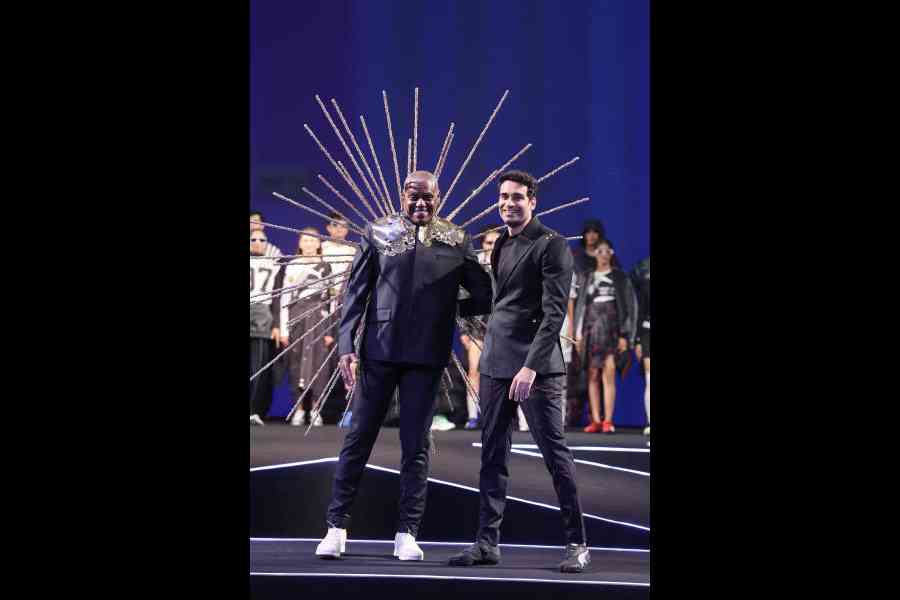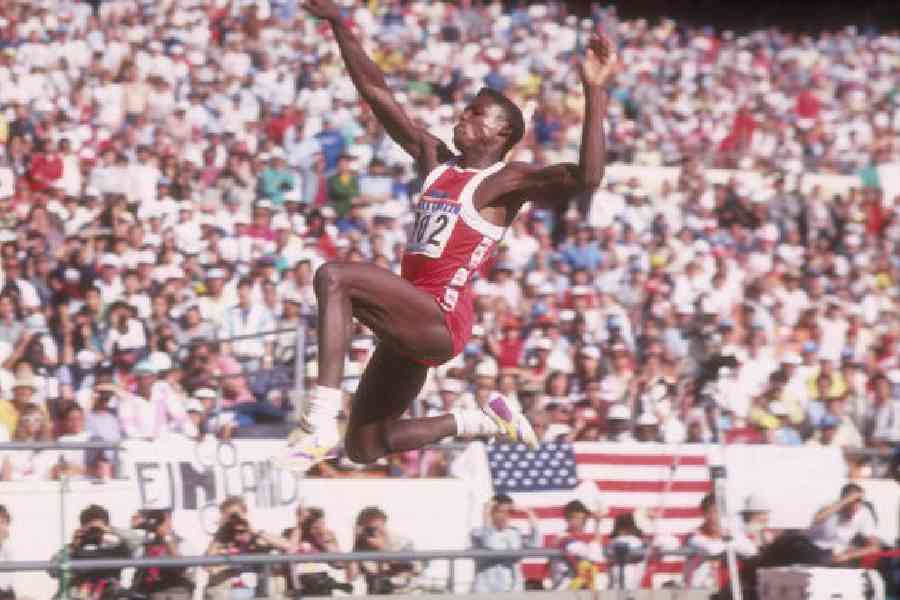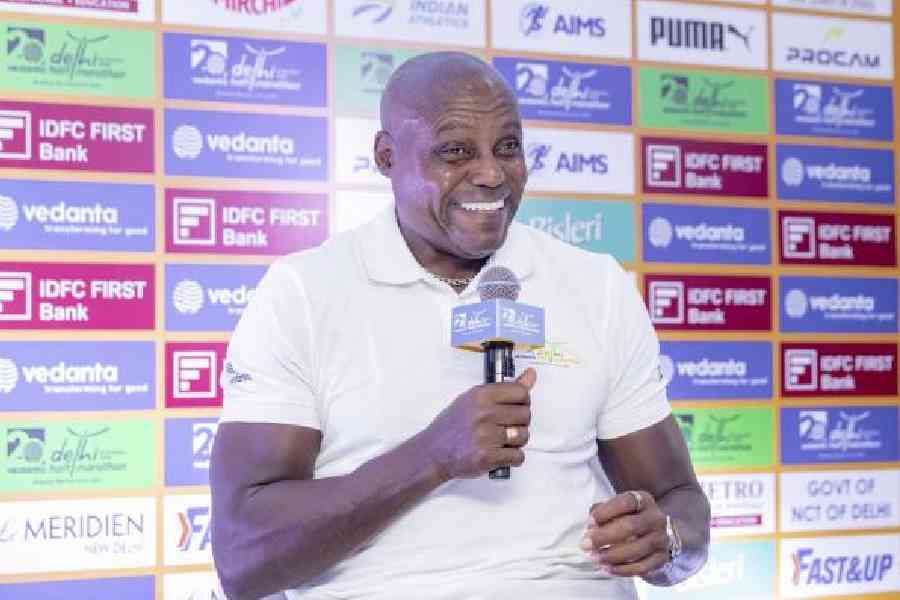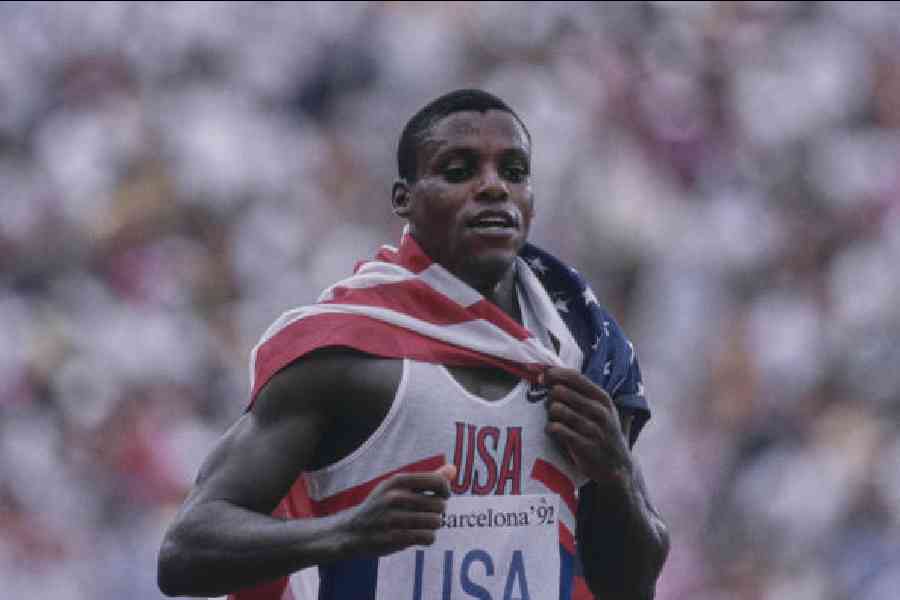At 64, Carl Lewis looks fighting fit when we meet the talismanic US athlete at the ballroom of Le Meridien in Delhi on an October afternoon. In India for the Vedanta Delhi Half Marathon, promoted by Procam International, the legendary Olympian with nine Olympic gold medals won across four Olympic Games, from 1984-1996, greeted us with a booming voice and much enthusiasm, despite a long day. On the sidelines of the event, we sat down with the iconic athlete for a chat. Through the conversation, Lewis, who was crowned the ‘Sportsman of the Century’ by the International Olympic Committee in 1999, spoke with candour and clarity on his career, spiritualism and the road ahead. Excerpts...

Carl Lewis and Sahil Kochar
What has the India experience been like in the last two days for you?
It’s been great. I think that every time I come, I go to a different place, I see a different transformation. This event is incredible. Seeing 40,000 people start and run, and all different types of culture and ideas, and people that were the world’s fastest all the way down to people with disability. It was really a sight to see, and I’ve really enjoyed my time here.
Do you think marathons go beyond just fitness?
The great thing about an event like this is that it’s a family thing, and I think one of the most transformative parts of it is to see how so many women ran the race. And when the women come along with the men who have been running each race, it brings the whole family. And I think that’s the great, great point I saw today.
We heard you’re craving samosas!
Yes, absolutely, because I love Indian food.
What are your earliest memories of India, and do you remember when you came here first?
I do remember… I mean… vaguely… because it was 1989, but I do remember coming here, and of course, I had not been to the country before. I think the country was different. That’s almost 40 years ago.
In what ways?
I’m from Houston. You would not recognise Houston from 1989 to 2025.
And I feel like India is the same way. You know, in a lot of positive ways… our projection in the United States of everywhere around the world is that we’re on top and everyone else is somewhere else. And now to see a country like India that’s not a developing country, that is a developed country, an economic powerhouse of the future, just expand in so many ways. The middle class is building. I see homelessness is going down. These are all these positive things that I’ve noticed, and it’s done through economic development. It’s done through getting involved in the communities, bringing people into the city. So, it’s really been wonderful….
What are your favourite things to do when in India?
When I was competing, I was always encouraged to try the local food. And so I was able to understand the culture and the food of so many countries. Houston and New York are the most culturally diverse cities in the United States. So, therefore, we have an opportunity to have an area where they do have wonderful Indian food. They have Asian areas in Europe, and without true zoning, you may do that in the course of one mile.
So it is wonderful. But when you have the opportunity and the pleasure to go to these countries and come to somewhere like India, you want to take in as much of the culture each time you can. Well, that’s the way I believe.
I am from Calcutta, West Bengal. Your spiritual guru, Chinmoy Kumar Ghose, was also Bengali (born in East Bengal, now Bangladesh). Have you been to Calcutta?
I have not been to Calcutta. I haven’t been invited! Why has no one invited me?! Invite me the next time, and I will make sure we go there. I’ve been all over India, but I have not been to (Calcutta). So, you’re inviting me!
Done! How has spirituality transformed you as a person?
What’s interesting is that it’s helped me focus and, you know, find an inner strength. I’ve watched people do things they never thought they could do. And it’s not just about me and running and running fast. Someone who was overweight and needed to get in shape, and the next year they’re running a marathon. And they’re fit and ready. So, these are the kind of things, because you can use your inner strength to conquer any world that you want to challenge.

Carl Lewis at the Olympic Games in Seoul, South Korea, in 1988
Did it come to you at a point when you were feeling low?
The fortunate thing for me was that I was able to meet Sri Chinmoy through a really dear friend of mine, Michael Walden, the musician, back in 1983.
I’ve never looked to anything as something, as a crutch to help lift me. It’s always been an inspiration to expand and to grow and to be bigger and to do more, as opposed to like, ‘Oh, it’s a sad time, pick me back up’. No, it’s not about pick-me-up. It’s about expansion and growth.
Your career is an exemplary one. Now when you look back at it, do you kind of pinch yourself sometimes and say how far you’ve come?
Well, the thing is that in reality, the way the world is now, if you are successful in the past, you’re humbled now because there’s such an emphasis on how we look at a celebrity, how we look at success. It’s different now.
Before it was about honours and deeds. And in many cases, now it’s about attention and ‘look at me’. It’s good in a lot of ways, and we don’t have to just emphasise that part of it, but it also kind of says why we’re in the situation we are in this world. When we did focus on the deeds and what people accomplished and what they were trying to do and how they were trying to help… and now it’s about, can I get enough attention? Look at me over here, and how many followers do I have? And look how important I make myself.
Who inspired you at the beginning of your career? Did you always want to be an athlete?
Well, I was inspired by my parents. They were wonderful. They started the track club that we started in, and sports was a very important part of our lives. They both coached and they both started the programme. So, sports was an important part of our life because it was the one thing that brought us all together. And I think that’s what I love the most about my childhood.
We were a family. We were a close-knit family. We were always together. And we didn’t do a lot of the vacations and things that a lot of families do because we were involved in that. They were both teachers, you know, modest middle-class teachers. But even that was challenging because a lot of the money they spent was on the track, me and everything else.

Carl Lewis
But if you look on the outside at our family growing up, you would think, wow, that was kind of unconventional. I mean, they didn’t do a lot of vacations. They didn’t do this. They didn’t do that. But what we did do is we had love. We had support. All of our friends were doing that. And I wouldn’t change it for the world.
Who were the people that you looked up to when you were growing up?
My father talked about Jesse Owens. There was an athlete, an American basketball player named Bill Russell. He loved Bill Russell. And, fortunately, he was able to meet him later in his life. So those are the two that they talked about.
But I think our life wasn’t just about sports. You know, my parents were involved in the civil rights movement. So they also talked about Rosa Parks, whom my parents knew. Or, Dr Martin Luther King (Jr), who my parents knew. Those are the stories we heard. Or, Bayard Rustin. These are the things we talked about at the dinner table. And politics. And the Kennedy family, who I’ve been able to meet a lot of them and be a part of. And the challenges that people have in the world. Those were our dinner-table discussions. And I’m so fortunate it was that instead of what it is now. And you’re talking about, ‘Oh, my God, I had so many hits. Or I had so many likes’. I’m glad I missed that part of it and just talked about things of relevance and of importance.
When you won your first Olympic medal and your last one, did you feel any different?
Oh, yeah, yeah, yeah. First of all, my father passed away before the second Olympic Games. He saw me win four gold medals. And it was about family. It was about (being) together. And I needed that because there were a lot of challenges, I needed my family there to support me and help lift me up and fight the challenges. I was great as long as I said, I’ll just stay in my corner and be happy. But the minute I started talking about professionalism, empowerment for the athletes, all of a sudden, it became a challenge.
And so it was great that I had my family to support me then. So the first Olympic medal was just incredible because you never know what it’s like until you’re there. And the pressure of going to the Olympics is just immense in the television, in my home country.
So that was that. But the last one, I knew it was my last Olympics. So it was like I was appreciating it, knowing that it’ll never happen again.
What is that emotion like when you’re standing on the podium with an Olympic medal around your neck?
I think that the easiest emotion to describe is, it isn’t like the hard work, it isn’t winning the medal, and I’m happy. That to me wasn’t the emotion. The emotion was, I always felt like I made my parents proud. And that was something, when I look at races now, I look to see the videos of like my mother happy or my father happy. And to think that if you knew me when I was little, you would have never thought that I would have become this athlete, because I was a very slow bloomer.
And for them to just sit there and go to bed at night and say, ‘Gosh, you know, my baby, my baby’. So that to me is what I thought about on that stand. I always thought about them.
How did you build yourself up for your career?
There’s this funny, funny thing they used to have, like books and papers! (Laughs out loud) The information was there. We just found it differently, and it was more challenging to find it. But I think it was great because all the information we had, we had to go get it. It was there. They’ve always been people who knew about diet, nutrition, exercise and body movement. All this stuff was there, but you had to go seek it out in a way. It wasn’t just real quick, let me get it. It was, I need to go through it, go through something, you know, cue cards and micro fishing. And so I think it was more empowering because you actually had to make the effort, the extra effort to get that kind of information.
Was it always trial and error with fitness and nutrition, for you?
That’s called life. We all live by trial and error. Thank goodness. I think that if you take life, like I did, sports helped me evaluate life, and the way I did it is that it helped me not be afraid to try things and not be afraid of failure and losing. And that could be on the track. It could be in life. It could be challenging. So that was the best thing it did. It really did. I went for four gold medals when everyone thought that I couldn’t do it, not because they were negative, because it’s like, how could you do this? It can’t be done. And we don’t even know how to do it. Jesse Owens isn’t alive. His coach isn’t alive. Who do we ask? And so, it was a natural thought process for people to think it couldn’t be done, but I wasn’t afraid to try. And that’s the only reason I did it, because I wasn’t afraid to try.
That’s a champion mentality, right?
Well, I think it’s beyond that. I think it’s a life mentality because when you go through life, you know, I look at my parents, they were wonderful parents, and I see a wonderful marriage, but I know behind the scenes, there were a lot of challenges in their marriage. And I know that they had a lot of fights, and on a lot of weekends, she said, ‘Well, I’m mad at you. I’m not cooking.’ I know that happened, but they figured it out. And that’s because that’s life.
And that’s the wonderful thing about it. But their emphasis was, we’re going to do this and figure this out and keep it going. The world is going to see the positive in our life.
And I think that’s what life is about… it always challenges. It’s never going to be easy. And once you start becoming a public figure or in a relationship or in a friendship, then all of a sudden, the emphasis on yourself is shared.And if you want to be successful, you have to share that emphasis. If I wanted to be successful as an athlete, I had to share my time with training. I couldn’t go everywhere I wanted to go. I couldn’t do everything I wanted to do. I couldn’t stay out at night. I had to eat food maybe I didn’t want to eat or I couldn’t eat things that I wanted to eat. So, it’s always like you’re making a sacrifice.
That’s everyone in life. And so I learned those kind of things. And I think that’s the great thing I got out of sports.
Who are the toughest athletes from your era that you competed with?
I would say Ben Johnson was tough because it’s not because of the athleticism, because of the drug and the issue he had to deal with. Mike Powell obviously was the toughest because he broke the world record on my best day, the best day I ever had in my entire career; he beat me that day. So, Mike Powell. Leroy Burrell was an incredible competitor I had to deal with all the time. Linford Christie for a period of time.
So the uniqueness of my career is that I stayed around long enough to have different eras. The early ‘80s was Calvin Smith, but I was pretty dominant in that period. And then the late ‘80s was Leroy Burrell and Ben Johnson, all of that fiasco. Then into the ‘90s, it became Mike Powell and Linford Christie. So I kind of had three generations, and it was like, every time I said, ‘Okay, I fixed this’, then all of a sudden someone else comes and I’m like, ‘Oh, here we go again’.
What has been the key to your long career?
Well, the longevity came from really two things — keeping things simple and having the best coach of the 20th century, Tom Tellez. Without him, you wouldn’t know me. And he kept me grounded, kept me focused.
And no matter what, when I did music, I did acting, I did all these things, when I came out to the track, I was grounded, and I respected coach Tellez. He was just the greatest mentor I could have ever had. And I would not have been able to do anything without him.
Sports humbles you, right?
Sports does everything to you. I mean, it humbles you, it makes you happy, it makes you sad, it gives you stories. Boy, I tell you, I’ve had some of the things that happened to me physically in practice that I can’t even think. I’ve been hurting so bad that I couldn’t even walk. I couldn’t think.
And then you have the highest highs, the lowest lows, all the things. Sports does everything. Every single emotion you can imagine, you go through it in sports.
How has your fitness changed now?
It’s very challenging, especially now that I’m over 60. You can’t eat the same. You can’t work out the same. It’s just different. But that’s for everyone. And so I think what it does is, here again, it explains, you can be the greatest athlete, you can be the fastest man in the world. You can be everything. But you’re still just like everyone else.
So now I’m a 60-year-old man trying to make sure I stay in shape, I get enough rest. And that’s the good thing about it. You realise and you show the world that I’m the same. And I’m going through the same challenges that everyone else does. And it’s a good thing. It’s a humbling thing.
What’s a day in your life like, now?
Well, I’m coaching, so that’s definitely a part of it. I start three days a week with a Zoom stretching lesson because I need to keep my flexibility. That helps me get older. I have a couple of dogs. And right now, at this moment, I’m building a new home. So that’s a part of it. And I just try to keep it as simple as possible.
I go to bed a lot earlier than I used to, most of the time. And I get up earlier than I used to, most of the time. So, it’s pretty simple.
The thing that makes my life different is events and things that I have to go to, as Carl Lewis. But other than that, it’s pretty simple. It’s like probably almost everyone else every day.
Do you run a little bit now?
No, I don’t run. I don’t run at all. I love to ride my bike. That’s how I get my fitness. But I also lift weights. I watch my diet. I love to swim in the pool. So, these are a lot of things that normal people do, yeah.
And working with young people, has that kept you young in the mind?
Oh no, working with young people makes me old! Those kids. Well, the young kids make me young. The college kids make me old… it’s just the way society is now. The way we have carved society.... Every three or four years, they’re different. So, it’s not the same kids. You’re getting a whole different set of kids with different ideas and different things. So that’s, yeah, they kind of make me old.
How did movies happen?
Because I wanted everything. And I tell people, why not want everything? You should want to be everything and not be afraid to try.
Are you doing anything in terms of movies now?
No, not now. I do have a documentary. My documentary, just finished, called I’m Carl Lewis! That will be out soon all around the world. That was a challenge. Because if you’re working on a documentary, especially if you want to depict the life that you lived or the story that you want to tell, you have to be a producer as well, because you have to be a part of it, because you’re telling the story from your perspective.
And when you’re an athlete or celebrity, most times, things are being told about you from their perspective. And now you have a chance to tell yours. So, it’s a lot more engaging.
Do you follow any of the sports?
Yeah, I watch. I watch all sports. Next year, the World Cup is coming to Houston, the United States. And I’m excited about that. I love American football. I’m a Philadelphia Eagles fan. I’m a Houston Texans fan and a Houston fan of all the sports.
So yes, I do. I admire the sports and athletes because I know the work it takes. I’m a college coach, so I watch college sports as well.
How would you sum up your life?
I have had a good life. There’s nothing to complain about. I’ve had so many challenges, challenges that a lot of people think were too much, but there’s absolutely no way I could ever complain.











